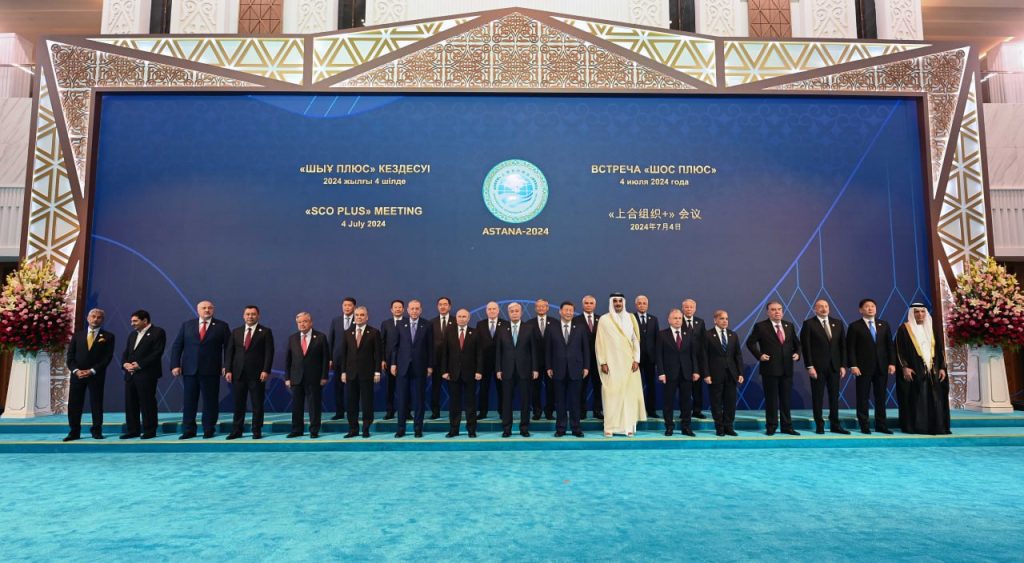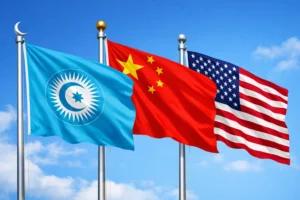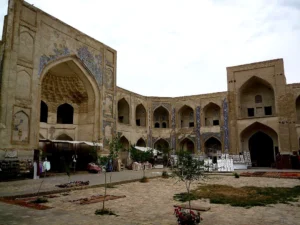Well Done Kazakhstan : Exemplary host of SCO Summit 2024

The successful host of the 24th Shanghai Cooperation Organization (SCO) summit in Astana marks a significant milestone in Kazakhstan’s role in bolstering global peace, security, and stability and shaping the global community. The visionary leadership under President Kassym-Jomart Tokayev has been playing an integral role by leading initiatives and proposing projects at multilateral institutions for the enhancement of cooperation with other states.
As the chair of the SCO, Kazakhstan demonstrated its ability to bring together heads of state and government from 16 countries, alongside leaders of prestigious international organizations, to address a broad spectrum of globally significant issues.
The SCO has become a crucial regional organization and serves as a crucial mechanism, contributing substantially to ensuring sustainable growth. This was highlighted by Kazakh President Kassym Jomart Tokayev, who noted that the SCO Heads of State Council meeting addressed concerns of the global community, underscoring the organization’s importance in fostering international cooperation and stability. The summit saw participation from ten SCO member states—Belarus, China, India, Iran, Kazakhstan, Kyrgyzstan, Pakistan, Russia, Tajikistan, and Uzbekistan—as well as guest countries such as Azerbaijan, Mongolia, Qatar, Türkiye, and Turkmenistan. International organizations, including the UN, CICA, CIS, CSTO, EEC, and OIC, also took part in the summit, reflecting the SCO’s broad and inclusive approach.
One of the summit’s key outcomes was the adoption of several pivotal documents, including the Astana Declaration, the initiative on World Unity for Just Peace, Harmony, and Development proposed by Kazakhstan, the SCO Development Strategy until 2025, the Cooperation Program to Counter Terrorism, Separatism, and Extremism for 2025-2027, the Anti-Drug Strategy, and the Energy Cooperation Development Strategy. These documents underscore the SCO’s commitment to addressing critical global challenges and fostering a cooperative and harmonious international environment. They collectively reinforce the SCO’s commitment to fostering peace, security, and development in the region. Additionally, resolutions encompassed the Association of Investors, program for developing cooperation in protected areas and eco-tourism, and mechanisms for financing SCO project activities.
The summit also underscored the growing membership of the SCO, with Belarus becoming a full member and other countries like Bangladesh, Laos, and Qatar expressing interest in joining. This expansion reflects the organization’s evolving focus from regional to global issues, with implications for the global agenda in environmental, economic, and energy areas.
Key Takeaways and Future Roadmap
The summit’s significant proposals, such as the Initiative on World Unity for a Just Peace, Harmony, and Development and the SCO Development Strategy until 2035, outline a clear roadmap for the organization’s future. These proposals emphasize collective contributions and the adoption of strategies for combating terrorism, drug trafficking, and fostering economic and energy cooperation. The future of the SCO depends on the implementation of these policies, with Kazakhstan playing a crucial role in steering these initiatives.
Further commitments included signing a memorandum of understanding between the SCO Secretariat and the Central Asian Regional Information Coordination Center to combat illicit drug trafficking. Security has always been a core focus of the SCO, and the Astana summit reinforced this with the adoption of the Cooperation Program to Counter Terrorism, Separatism, and Extremism for 25–2027. The strategy to counter drug trafficking is particularly relevant for Kazakhstan, highlighting its commitment to ensuring the well-being of its population. The SCO’s role in bridging the East and West, with Kazakhstan’s presidency providing an opportunity to address geo-economic and geopolitical challenges, was another crucial aspect discussed at the summit.
The SCO’s role in bridging East and West is crucial, and Kazakhstan’s chairmanship’s presented an opportunity to address geo-economic and geopolitical challenges. The country role in the SCO facilitates the development of trade, investment, and technological exchange, providing access to new markets and opportunities for foreign investment.
During its chairmanship, Kazakhstan facilitated the SCO framework to address current problems, explore solutions, and deepen collaboration, providing opportunities to participate in international dialogues and influence decision-making related to regional security, stability, and development. Its role in the SCO has the main advantage of expanding economic cooperation with other participating countries. The SCO promotes the development of trade, investment, technological exchange, and other forms of economic interaction between countries.
Kazakhstan’s position as a middle power in Central Asia facilitates the development of bilateral and multilateral ties with each SCO member country. The organization’s openness to new members, such as Belarus, and its expanding range of topics from regional to global issues indicate its growing role on the global agenda, including in environmental, economic, and energy areas.
The visionary leadership’s successful host of the SCO summit in Astana has solidified its position as a key player in the region and highlighted its strategic importance in fostering multilateral cooperation. The summit’s outcomes, including the adoption of key documents and strategies, reflect Kazakhstan’s commitment to promoting peace, security, and development.


